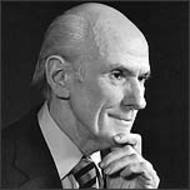November 16, 1999
By Alan Cranston
San Francisco Examiner
LOS ALTOS HILLS: Shortly after atomic bombs fell on Hiroshima and Nagasaki, I met Albert Einstein. He warned if the bomb were developed further, and ever used all-out, the human race could be exterminated.
The bomb has been developed further. One super bomb could now let loose more destructive energy than all that has been released from all weapons fired in all wars in all history.
The power of self-extinction is now in our uncertain hands.
The leaders responsible for America’s defense warn that the only significant threat today to the security and survival of the U.S. is nuclear proliferation. Their Alice in Wonderland position seems to be that the danger lies in nations that do not possess nuclear weapons, not in those that do.
Actually, nuclear weapons beget nuclear weapons.
The threat of a Hitler bomb begot the American bomb. The American arsenal begot the Soviet arsenal. The U.S. and Soviet arsenals led to the British, French and Chinese arsenals. These led to bombs of Israel, India and Pakistan.
What next?
The U.S. Senate’s recent rejection of the Comprehensive Test Ban Treaty, and the Russian Duma’s failure to ratify START II, suggest the two nations with the largest nuclear arsenals intend to hang onto them forever.
This is a prescription for more begetting.
The Non-Proliferation Treaty was a bargain. The 180 nations without nuclear weapons pledged not to acquire them-and they haven’t. The five nations that had nuclear weapons when the treaty was negotiated decades ago-China, France, the Soviet Union (Russia), the United Kingdom and the United States-pledged to get rid of them-but they haven’t.
The 180 are losing patience. Some may withdraw from the Non-Proliferation Treaty, advising the U.S. and the other nuclear nations: “If you need these weapons so badly, maybe we need them too.”
Today’s rogue states and terrorists seek the bomb. And there’s grave danger that “loose nukes” can be bought or stolen in Russia, where command, control and custody are deteriorating.
Russian chaos could cause an accidental or unauthorized nuclear launch that could provoke a U.S.-Russian holocaust. By no means immune from error, too, are U.S. missiles and warheads, the computers that direct their use, and the human beings who command the computers.
It is more likely now than it was during the more stable days of the Cold War that weapons of mass destruction will be used. Former Secretary of Defense William Perry says, “It isn’t a question of whether, but of where and when.” Gen. Charles Horner, who commanded Allied Air Forces in the Gulf War, says he expects that a nuclear weapon will be exploded in some city in the next 10 years. Former Ambassador Robert Galluci, who negotiated on nuclear weapons with Iraq and North Korea, agrees and predicts it will be an American city. Galucci described how it could happen:
“One of these (rogue) governments fabricates a couple of nuclear weapons and gives them to a terrorist group created for this purpose. The group brings one of these bombs into Baltimore by boat, and drives another one up to Pittsburgh. Then the message comes to the White House. ‘Adjust your policy in the Middle East, or on Tuesday you lose Baltimore, and on Wednesday you lose Pittsburgh.’ Tuesday comes, and we lose Baltimore.
“What does the U.S. do?”
More and more American leaders-among them many generals and admirals-are coming to believe that the only way to eliminate the threat of a nuclear holocaust is to eliminate all nuclear weapons. Among them are Gen. Colin Powell and Gen. Lee Butler, former commander-in-chief of the Strategic Air Command.
These weapons have cost U.S. taxpayers over $5 trillion so far. They presently cost $37 billion a year-diverting money from other needs.
I urge those who have not yet embraced the goal of abolition to think all this over, and with great care. The stakes are immense-all life.
Is it worthy of our nation to base its security on terror, on the threat to annihilate millions of innocent humans, on the threat of genocide?
Is our policy of Mutual Assured Destruction-a policy that puts the human race at risk of extinction-worthy of civilization?
Is it wise?
“We cannot at once hold sacred the miracle of existence and hold sacrosanct the capacity to destroy it,” says Butler. “Deterrence.at best is a gamble no mortal should pretend to make. At worst it invokes death on a scale rivaling the power of the creator.”
____________________________
Examiner contributor Alan Cranston represented California in the U.S. Senate from1969 to 1993.
Jonathan Granoff is the President of the Global Security Institute, a representative to United Nations of the World Summits of Nobel Peace Laureates, a former Adjunct Professor of International Law at Widener University School of Law, and Senior Advisor to the Committee on National Security American Bar Association International Law Section.








